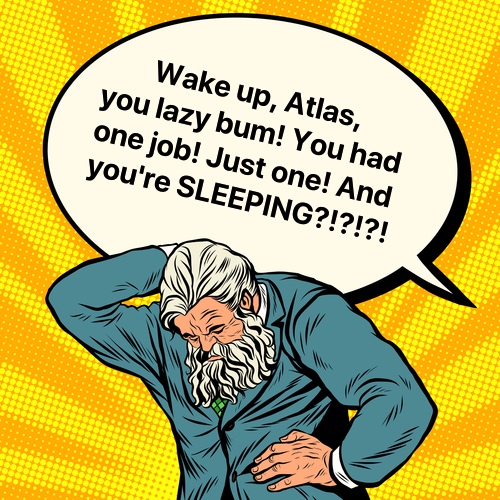The story of Atlas is not a happy one.
According to Greek mythology, Atlas participated in a war that he and his fellow Titans waged upon the Gods. The Titans were defeated by the Gods, led by Zeus. As punishment for the war, Zeus banished most of the Titans to the hellish Tartarus. For Atlas, Zeus chose for him to stand at the edge of the world and hold up the sky to keep the two from squeezing against each other.
Later, Hercules was assigned to gather 12 golden apples from the garden of Hera. These apples were guarded by Atlas’ daughters, (who apparently weren’t very nice) and a dragon. Hercules duped Atlas into fetching the apples from his own daughters while he held up the sky. Atlas, thinking he was going to pull a fast one on Hercules, gladly obliged. Later he returned with a sack full of the golden apples, pleased with himself. But Hercules asked Atlas if he would kindly hold the sky for a minute while he rearranged his cloak. Atlas agreed. Hercules simply took the sack of apples and ran off, never to return, once again leaving Atlas with the task of holding up the sky for the rest of eternity.
We know the pictures of Atlas holding a globe on his shoulders, which most of the time we think represents the earth. But this globe actually represents the celestial sphere of ancient astronomy. In a sense, Atlas is not holding the world on his shoulders, but instead the weight of the universe.
What This Means To Your Health
Just like how the Titan Atlas holds up the universe on his shoulders, your top cervical vertebra, a little 2 ounce doughnut-shaped bone, aptly named the atlas, holds up the 14-16 lb weight of your universe. Your universe is your body’s innate intelligence. It controls every single aspect of your body and nervous system.
The story of Atlas is obviously a myth, but what do you think would have happened had Atlas slipped? Would the heavens have come crashing down upon the earth?
What happens when your atlas (aka the C1 vertebra), held in place by only ligaments and tendons, slips to the left or the right? Is it fair to say your universe could come crashing down, albeit slowly over time?
Would your spine be better off if your atlas sat in its normal position, allowing brain-to-body communication to flow freely back and forth? Or do you think it would be fine if your atlas slipped off to the side, rotated and rocked up or down in an abnormal position at the top of your spine, causing spinal compensations all the way down, leading to a disruption of that vital brain-body communication, unilateral muscles tightness, and advanced degeneration of vertebrae?
Personally, I prefer the first choice.












